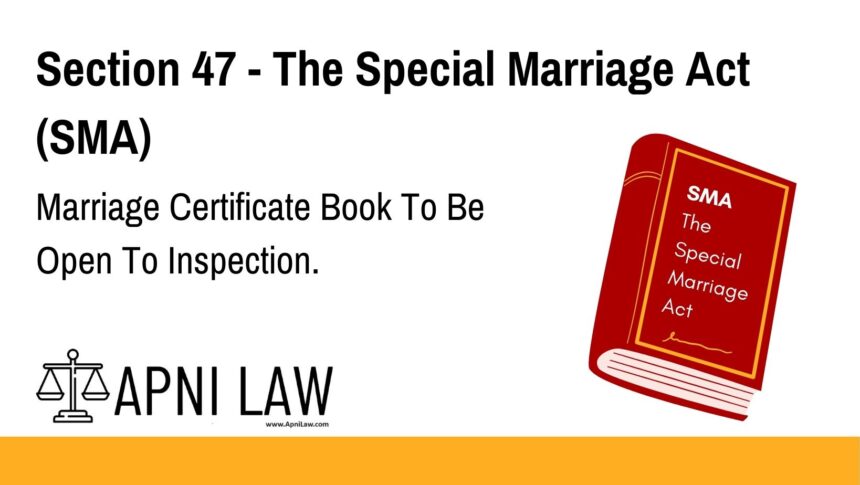Code: Section 46, Special Marriage Act, 1954
“Any Marriage Officer who knowingly and wilfully solemnizes a marriage under this Act—
(1) without publishing a notice regarding such marriage as required by section 5, or
(2) within thirty days of the publication of the notice of such marriage, or
(3) in contravention of any other provision in this Act,
shall be punishable with simple imprisonment for a term which may extend to one year, or with fine which may extend to five hundred rupees, or with both.”
Explanation of Section 46 – Special Marriage Act
Section 46 of the Special Marriage Act, 1954 holds Marriage Officers accountable for misconduct or non-compliance with statutory procedures. The provision prescribes punishment if a Marriage Officer:
- Fails to publish the mandatory notice under Section 5,
- Solemnizes a marriage within 30 days of the notice, or
- Violates any other provision of the Act while solemnizing a marriage.
This section ensures that Marriage Officers strictly follow the procedural safeguards laid down under the Act to protect the legality and transparency of civil marriages.
Key Provisions
- Applies only to designated Marriage Officers under the Special Marriage Act.
- Penalty is triggered by:
- Failure to publish marriage notice under Section 5
Read Section 5 – Notice of intended marriage - Solemnization of marriage within the prohibited 30-day period.
- Violation of any other provision of the Act.
- Failure to publish marriage notice under Section 5
- Punishment:
- Simple imprisonment up to 1 year, or
- Fine up to ₹500, or
- Both.
Illustration
Example 1: Marriage Officer Skips Publication of Notice
A couple applies for marriage under the Special Marriage Act. The Marriage Officer solemnizes the marriage the very next day without publishing the notice as required under Section 5. This is a direct violation of Section 46 and makes the officer liable for prosecution.
Example 2: Marriage Within 30 Days of Notice
If the Marriage Officer solemnizes a marriage on the 10th day after the publication of notice, without waiting for the mandatory 30-day period, it constitutes a punishable offence under this section.
Example 3: Ignoring Objections
If an objection is filed during the 30-day notice period and the officer disregards it and proceeds with the marriage, this may also fall under “contravention of any other provision,” making the officer liable under Section 46.
Common Questions & Answers on Section 46 SMA
1. What is the purpose of penalizing the Marriage Officer under this section?
The aim is to uphold procedural integrity and prevent marriages that may be legally or socially invalid due to procedural irregularities.
2. Can a Marriage Officer be punished even if the couple consents?
Yes. Even with mutual consent, violating the procedure (such as skipping the 30-day waiting period or not publishing the notice) is a punishable offence.
3. Does this affect the validity of the marriage?
While Section 46 punishes the officer, it does not automatically render the marriage void. However, procedural lapses may be grounds for challenge depending on circumstances.
4. Who can initiate proceedings against a Marriage Officer?
Complaints can be made by affected parties or authorities. The court may take cognizance based on evidence of procedural breach.
Conclusion
Section 46 of the Special Marriage Act plays a crucial role in maintaining transparency and procedural integrity in civil marriages. By imposing penalties on Marriage Officers for wrongful acts, the law ensures that all formalities are properly observed, safeguarding the rights of the marrying parties and maintaining public trust in the legal marriage process.
For more expert legal commentary and updates, visit ApniLaw.








